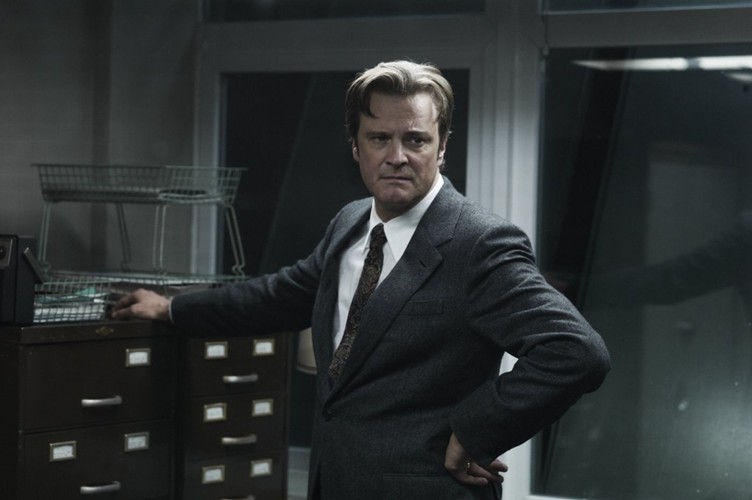Tinker Tailor Soldier Spy

Here's an engrossing Cold War spy thriller for adults. If Bond is the fantasy, here is the prosaic reality. It has a very British way of respecting its audience's intelligence. I'm not going to say much about the plot because (1) especially in a movie like this, it's better for you to discover that for yourself; (2) you’re not really going to be able to follow all of it anyway (I couldn't); and (3) I’d argue that the plot is not really what the film is about.
Instead it is an elegy on betrayal and trust, both personal and geopolitical, which expresses those themes through character, and none moreso than that of George Smiley, played by Gary Oldman in a haunted, quiet performance that is still resonating with me. So many thrillers define a character by one trait (if that), but the people in "Tinker Tailor" are real human beings, down to the bit parts. Very quickly you get an idea of who these people are, thanks to the writing and deft work from the cream of the British acting crop.
Adapted by Bridget O'Connor and Peter Straughan from a John Le Carre novel I haven't read, suffice it to say that "Tinker Tailor" focuses on a handful of men who run MI6, the foreign relations branch of British intelligence. Seated around the table are Toby Jones, Ciarin Hinds, John Hurt, David Dencik and Colin Firth, this last of whom is a bit too aware that he has the dashing looks and charisma Smiley lacks. We see that MI6 is a close-knit outfit, a kinship, though rife with all the rivalries that are the flip side of intimacy: as much rivals as colleagues, the men have an Oxbridge way of cutting on each other. (There is perhaps some English class-system stuff going on here as well, though I'm not versed enough in the niceties of accent and argot to pick up on it.)
Smiley is right-hand man to the boss, Control (John Hurt). Though at the beginning the two of them are forced out of MI6 by the government, when secret allegations arise that one of the members of their star chamber is a double agent for the Russians, the government decides that Smiley is the perfect man to conduct the secret investigation.
Also at play in the story is Tom Hardy as a young spy who has fallen in love with a woman (Amanda Fairbank-Hynes) mixed up with an easterner that MI6 has had its eye on. Hardy doesn't want to end up with the regrets he sees in the older men: he's ready to chuck it all in for her. He can see that a man like Smiley has ended up, essentially, alone.
Smiley's method seems to be: "Say little, do little." He is comfortable with silence. He knows that other people are not, that they will often say more than they intend just to fill it. Life has been such for him that he has no real attitude towards it except a kind of acceptance, though there's something just slightly wry, ironic about the cast of his mouth. He is steely under his facade of utter calm. Oldman lets the shadow of regret play around his features. The film feels haunted because Smiley is: he knows that his wife, whom we never see, has betrayed him with another man. Still, he gives no outward indication that he even suspects this most intimate of betrayals. Smiley is the epitome of "stiff upper lip," and in fact the film sometimes seems to be a meditation on the British character.
He is a man who has sustained much, though only in one scene does he show it, where he tells the story of his harrowing meeting with “Carla”--evidently some Russian agent of legendary mendacity--over scotch. You see in his eyes how deeply rattled, even haunted, he was by the encounter.

Smiley goes calling on a former colleague (Mark Strong) who is in a sort of witness protection progam for spies, having assumed the identity of a rural schoolteacher. Smiley does not advance on his former colleague right away. In fact, he stands at a distance for some time with his back turned, looking out over a pond, allowing himself to be seen. The "teacher" spies him and understands the implication of the visit. He turns to a young boy, an outsider like himself whom he's taken under his wing. Look at that man, he says to the boy. Who do you suppose he is? Why does he stand with his back turned to us? Does he not like us? Even to this man, Smiley is an enigma.
Cinematographer Hoyte Van Hoytema keeps the images deeply focused, everything sharp and clear in a world where nothing is. The look and feel of the early 70s is nicely evoked, showing how the counterculture was absorbed even into the MI6: the hairstyles, the sideburns, the clothes, an easygoing manner about sex.
There are no real climaxes here. Tomas Alfredson directs in a style that favors elision and portent. He knows how to sustain tension, particularly in a scene where a young agent (Benedict Cumberbatch) attempts to smuggle a file for Smiley from under the noses of the agency. Still, if you're looking for big action set-pieces, this is not the film for you (though it will stay with you long after you've forgotten those). There are no heroes, no heroics in this spy story. These are grown men in the real world.
Key to ratings:
***** (essential viewing)
**** (excellent)
*** (worth a look)
** (forgettable)
* (rubbish!!)


 Scott Pfeiffer
Scott Pfeiffer
Reader Comments (1)
We had planned to see this film tonight to celebrate Dad's birthday, but we didn't make it. Your review makes me want to see it ASAP. Sounds intriguing!